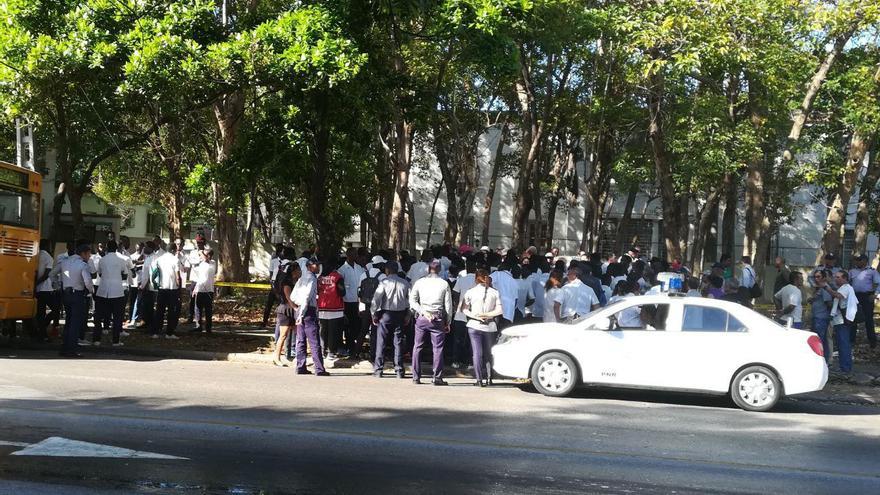
![]() 14ymedio, Havana, 26 March 2019 — Dozens of Congolese students protested Tuesday in front of their country’s embassy in Havana over the delay in the payment of their scholarships. The diplomatic headquarters of the Republic of the Congo was surrounded by a strong police operation while several officials ask for the young people’s “understanding,”14ymedio was able to confirm.
14ymedio, Havana, 26 March 2019 — Dozens of Congolese students protested Tuesday in front of their country’s embassy in Havana over the delay in the payment of their scholarships. The diplomatic headquarters of the Republic of the Congo was surrounded by a strong police operation while several officials ask for the young people’s “understanding,”14ymedio was able to confirm.
In front of the mansion of Fifth Avenue, between 10th and 12th, in the Miramar neighborhood, a large group of Congolese who study Medicine in Cuba gathered this morning. The young people shouted for the payment of their overdue stipends and asked the diplomatic headquarters to solve the matter urgently.
“We have gone months without receiving the payment that covers our basic needs for food and transportation,” one student, who declined to be identified, told 14ymedio. The amount, a little over 300 dollars, is essential for the young people because “the shelters where we live are in very bad condition and without that money everything is more difficult.”
“Since the beginning of the year we have not received a penny and some of us are surviving thanks to the help of other students and our families, but this can’t go on,” said the student. “If this is not resolved, many of us are ready to return to the Congo, because this is not living, so you can not study.”
This is not the first time this type of situation has occurred. At the beginning of 2015, the Congolese Loïc Junior Niombo, aged 20, was missing for two weeks. He was a member of the Union Committee for the Defense of the Rights of Medical Students from his country and was at the forefront of the negotiations during the crisis generated by the non-payment of the scholarships of the first 500 Congolese university students who arrived in Havana in 2013.
In the face of student protests, the then ambassador of the Republic of the Congo in Havana, Pascal Onguiémbi, proposed repatriating the six members of the union. The president of the African country, however, after estimating that it was not necessary to resort to expulsion, ensured that the students received part of their overdue scholarships.
The unionists claimed the remaining amount was seized by order of the ambassador shortly before Christmas, under the eyes of the authorities of the university campus. The Congolese National Convention of Human Rights (Conadho) then said that they were taken to a penitentiary center about 80 kilometers from Havana and released a few days later.
For decades, Cuban authorities have developed an extensive study program for foreigners on the island. It is currently estimated that 2,500 people from the African continent are students of Cuban faculties and, among them, about 800 Congolese are training as future doctors.
The Latin American School of Medicine (ELAM), founded in 1999, offers six-year studies to scholars from different countries and currently enrolled in its classrooms, for different medical disciplines, are students from 44 African countries.
Recently, Clement Mouamba, Congolese prime minister, conveyed to the Cuban ambassador in that country, José Antonio García González, his gratitude for the invaluable support of Cuba in the training of human resources, according to the official press.
Last January fifty medical students from Kenya announced that if they did not solve the “problems” they are having on the island as soon as possible, they will abandon their studies and return to their country, according to the Standard newspaper of Nairobi.
A protest by a group of medical students from Pakistan was suppressed in 2010 by forces of an unusual anti-riot squadron at their residence at the Santiago Haza School of Medicine, in Jagüey Grande.
________________________________
The 14ymedio team is committed to serious journalism that reflects the reality of deep Cuba. Thank you for joining us on this long road. We invite you to continue supporting us, but this time by becoming a member of 14ymedio. Together we can continue to transform journalism in Cuba.
